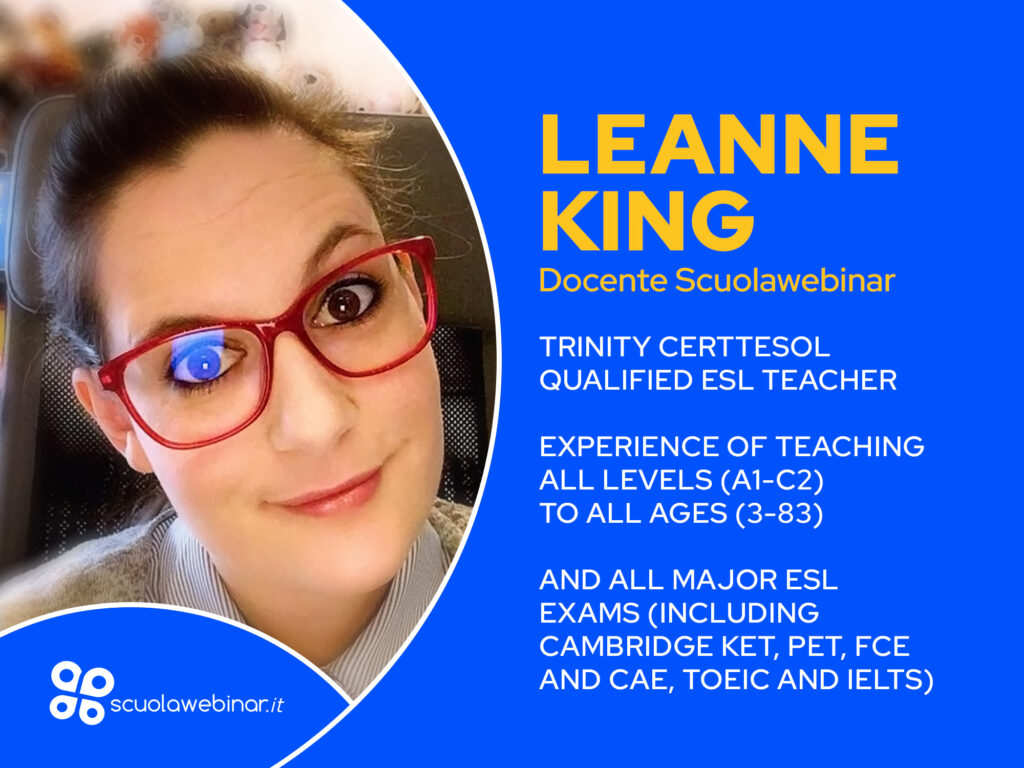ATTESTATO DI PARTECIPAZIONE
A tutti i partecipanti che completeranno il percorso formativo verrà rilasciato Attestato di partecipazione per 30 ore di formazione.
Per completare il corso e ricevere l’attestato non ci sono scadenze, puoi organizzarti come meglio credi in funzione delle tue esigenze. Il materiale del corso resta a tua disposizione per sempre.
Il corso è erogato dalla SINTAB Srl, ente accreditato dal MIUR per la formazione del personale della scuola.

ID SOFIA 76648 (interessa solo gli insegnanti di ruolo)
Personal environment
- asking for and giving personal information
- describing where one lives (area, accommodation, etc)
- asking and answering questions for confirmation, information, identification
- describing people, places and things
- correcting information
- explaining daily routines
- describing past events
- comparing things, people.
Expressing thoughts, feelings and attitudes
- expressing agreement or disagreement
- denying something
- expressing views and feelings with reasons
- stating and asking about knowledge or ignorance of something or someone
- stating and asking about ability or inability to do something
- stating and asking about certainty or uncertainty of something
- seeking, granting or denying permission
- expressing and asking about wishes and hopes
- expressing and asking about wants, desires, needs
- stating and asking about intention
- stating a preferenceexpressing and asking about likes and dislikes, with reasons
- expressing and asking about (dis)pleasure, (un)happiness
- expressing gratitude
- offering andaccepting an apology
- expressing approval or appreciation
- expressing regret.
Getting things done
- responding to a request
- requesting something or requesting someone to do something
- inviting someone to do something
- accepting or declining an offer or invitation
- giving instructions
- giving advice
- warning others to be careful or to stop doing something
- offering and requesting assistance
- suggesting a course of action.
- observing telephone conventions.
- getting someone’s attention
- greeting people and responding to greetings
- expressing thanks
- addressing somebody
- introducing oneself, family and close friends
- opening, closing a conversation
- congratulating someone
- indicating lack of understanding
- asking someone to clarify or explain something
- asking someone to repeat all or part of something
- asking someone to speak more slowly
- asking for help in finding words or phrases
- asking for and giving the spelling and meaning of words
- counting and using numbers
- asking for and telling people the time, day, date
- interrupting politely
- summing up
- taking leave
LISTENING
The candidate will be able to (Il candidato sarà in grado di:)
- understand speech which is clearly and slowly articulated
- follow short conversations both formal and informal connected with education, work and social life understanding gist, context, feelings, opinions and relationships
- understand simple questions, statements, narratives, directions, explanations and instructions
- identify the function of short utterances (see Grammar and Functions sections)
- extract and reproduce key information from simple spoken messages and announcements.
- recognise stress and intonation in simple and compound sentences
- understand key grammatical forms used in common everyday contexts and situations
- understand high frequency vocabulary and basic phrases relating to areas of immediate personal relevance in straightforward familiar formal and informal exchanges.
READING
- understand short simple narratives and descriptions, straightforward instructions, directions and explanations on familiar and work related topics
- recognise the different purposes of text when purpose and intended audience is clear
- locate specific predictable information in everyday short texts on familiar matters
- understand a simple line of argument simply expressed
- understand the main ideas and gist of simple personal letters
- understand routine letters on familiar topics
- understand everyday signs and notices found in public places.
- recognise high frequency words and words with common spelling patterns in everyday texts
- understand punctuation and capitalisation used in simple and compound sentences.
- understand simple social courtesies.
- understand the organisational, lexical and grammatical features of short simple texts
- understand a very limited range of cohesive devices
- identify the different purposes of short straightforward texts through layout conventions, common signs, symbols.
WRITING
The candidate will be able to: (Il candidato sarà in grado di:)
- compose simple texts using the appropriate format with some awareness of the intended audience
- follow instructions to write a letter, message or note
- write informally about family, living conditions, schooling and job, plans and arrangements, likes and dislikes and past activities
- write short descriptions or tell a simple story using simple and compound sentences
- write a short sequence of simple explanations, instructions or directions
- express simple opinions clearly
- spell correctly the majority of words used for personal detail and familiar common words
- write with reasonable accuracy short words appropriate to the level
- usepunctuation and capital letters correctly to show questions, commas in lists and proper nouns
- construct simple and compound sentences using basic structures
- use a limited range of vocabulary to deal with simple and familiar topics and tasks
- link a short sequence of simple sentences using basic linking words.















